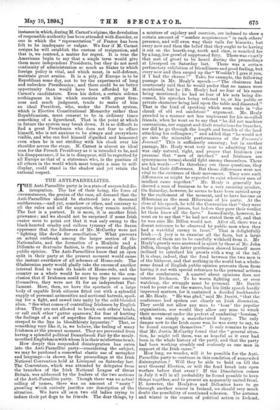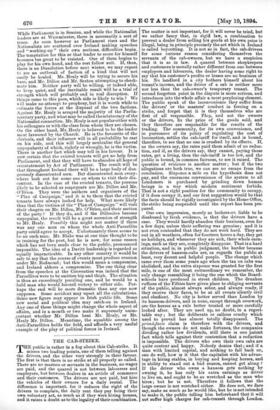THE ANTI-PARNELLITES. T HE Anti-Parnellite party is in a state of
suspended dis- integration. The law of their being, the force of circumstances, the genius of the race, all demand that the Anti-Parnellites should be shattered into a thousand smithereens,—and yet, somehow or other, and contrary to all the rules and all the auguries, they remain united. The fact is a portent. It is more, it is another Irish grievance ; and we should not be surprised if some Irish orator were to point out that it was only owing to the black-hearted cruelty and callous tyranny of the Saxon oppressor that the followers of Mr. McCarthy were not "fighting like devils for conciliation." What prevents an actual outbreak among the larger section of the Nationalists, and the formation of a Healyite and a Dillonite or Sextonite faction, is the pressure of English public opinion. The Anti-Parnellites know that an open split in their party at the present moment would cause the instant overthrow of all schemes of Home-rule. The Gladstonian party would gladly take the excuse of another internal feud to wash its hands of Home-rule, and the country as a whole would be sure to come to the con- clusion that if Irishmen could not keep the peace among themselves, they were not fit for an independent Par- liament. Here, then, we have the spectacle of a large body of capable Irish citizens fitted out with a splendid supply of personal animosities and sectional hatreds, spoil- ing for a fight, and cowed into unity by the cold-blooded alien. "See what comes of controlling Irishmen by English ideas. They are not allowed to break each others' heads, or call each other 'gutter sparrows,' for fear of hurting the feelings of a set of superfine Saxon sentimentalists, steeped to the lips in bloodthirsty hypocrisy." That, or something very like it, is, we believe, the feeling of many Irishmen at the present moment. They are prevented from having a splendid political Donnybrook Fair by the mealy- mouthed Englishmenwith whom it is their misfortune to act.
How deeply this suspended disintegration has eaten into the Anti-Parnellite party—considering the subject, we may be pardoned a somewhat elastic use of metaphor and language—is shown by the proceedings at the Irish National Convention held at Liverpool on Saturday last. The Convention, which was attended by delegates from the branches of the Irish National League of Great Britain, was addressed by the leaders of the two sections of the Anti-Parnellite party. Though there was no actual calling of names, there was an amount of " nasty " growling which entirely justifies our description of the situation. We have all seen two old ladies trying to induce their pet clogs to be friends. The dear things, by a mixture of cajolery and coercion, are induced to show a certain amount of "sombre acquiescence" in each others' presence, and will even wag their tails for biscuits ; but every now and then the belief that they ought to be having it out on the hearth-rug, tooth and claw, is vouched for by a long, low growl of suppressed fury. There was exactly that sort of growl to be heard during the proceedings at Liverpool on Saturday last. There was a certain perfunctory exhibition of friendliness and good feeling, but every now and then surged up the" Wouldn't I give it you, if I had the chance !" Take, for example, the following passage in Mr. Healy's speech :—" The chairman had courteously said that he would prefer that no names were mentioned, but he (Mr. Healy) had no fear of his name being mentioned ; he had no fear of his acts being dis- cussed, his speeches being referred to, or his public or private character being laid upon the table and dissected." That is the kind of speaking which soon ends in "the chunk of old red sandstone" argument. Mr. Healy growled in a manner not less unpleasant for his so-called friends, when he went on to say that "he did not machine conventions, nor suggest and draft resolutions for branches, nor did he go through the length and breadth of the land attacking his colleagues ; " and added that "he would not go into the miserable performances of the Freeman's Journal." This is sufficiently amusing ; but in another passage, Mr. Healy went very near to admitting that it was only natural, right, and proper that Irishmen (we presume that "men of intellect" and Irishmen are synonymous terms) should fight among themselves. These are his words :—" In threshing out these questions, they had had their differences. But those differences were not vital to the existence of their movement. They were such differences as might be expected to exist wherever men of intellect came together." Mr. Healy is generally too shrewd a man of business to be a very amusing speaker. On Saturday, however, he seems to have been carried away by the excitement of the moment, and to have become as Hibernian as the most Hibernian of his party. At the close of his speech, he told the Convention that "they were in the position of jurors, but before they gave their verdict let them know all the facts." Immediately, however, he went on to say that "he had. not stated them all, and that he was sure Mr. Dillon would not. After all, there was a decent reticence to be observed by public men.when they had a watchful enemy in front." That is delightfully Irish :—A jury is to examine all the facts, but a large portion of them are to be carefully withheld from it. Mr Healy's growls were answered in spirit by those of Mr. John Dillon, though the latter gentleman showed himself more inclined to interlard his growls with a wag of the tail. It is clear, indeed, that the feud between the two men is of the bitterest, and that nothing in the world but a whole- some dread of English public opinion prevents them from having it out with special reference to the personal actions of the combatants. A quarrel about opinions does not interest Irishmen. To be worth fighting out, or even watching, the struggle must be personal. Mr. Davitt tried to pour oil on the waters, but his little speech hardly improved matters, for it contained a decided backhander at Mr. Healy. "He was glad," said Mr. Davitt, "that the conference had spoken out clearly on Irish dissension. They could not allow any man to ' boss ' the popular organisation, nor would they allow any man to wreck their movement under the pretext of combating 'bossism,' which was simply a manufactured bogey. The only danger now to the Irish cause was, he was sorry to say, to be found amongst themselves." It only remains to state that Mr. Justin McCarthy found that the "general situa- tion, he might tell them, was as hopeful as it ever had been in the whole history of the party, and that the party had been working steadily and zealously as one man in support of the Irish cause." How long, we wonder, will it be possible for the Anti- Parnellite party to continue in this condition of suspended disintegration ? Will they be able to hold on till the next General Election, or will the feud break into open warfare before that event ? If the Dissolution comes in July it will in all probability belound possible to keep things together, and to present an apparently united front. If, however, the Healyites and .Dillonites have to go through another winter in Ireland, we should very much doubt the possibility of continued cohesion. The autumn and winter is the season of .political action in Ireland.. While Parliament is in Session, and while the Nationalist leaders are at Westminster, there is necessarily a sort of truce. As soon however as Parliament rises and the Nationalists are scattered over Ireland making speeches and " working-up " their own sections, difficulties begin. The temptation for this or that leader to score for himself becomes too great to be resisted. One of them begins to play for his own hand, and the rest follow suit. If, then, there is no Dissolution before next winter, we may expect to see an outbreak of faction of a kind that will not easily be healed. Mr. Healy will be trying to secure his base, and Mr. Dillon and Mr. Sexton attempting to check- mate him. Neither party will be willing, or indeed able, to kcep quiet, and the inevitable result will be a trial of strength which will probably end in real disruption. If things come to this pass, which side is likely to win ? We will make no attempt to prophesy, but it is worth while to estimate the forces at the disposal of the two factions. Against Mr. Healy is arrayed the majority of the Parlia- mentary party, and what may be called the aristocracy of the Nationalist connection. Mr. Healy is not popular either with his colleagues or with the class from whom they are chosen. On the other hand, Mr. Healy is believed to be the leader most favoured by the Church. He is the favourite of the clericals, and their influence will in all probability be cast, on his side, and this will largely neutralise the general unpopularity of which, rightly or wrongly, he is the victim. There is another fact which may tell in his favour. It is now certain that the evicted tenants will get no help from Parliament, and that they will have to abandon all hope of reinstatement by Act of Parliament. The result will be -that throughout Ireland there will be a large body of dan- gerously discontented men. But discontented men every- .where look out for some one on whom to visit their dis- content. In the case of the evicted tenants, the persons likely to be selected as scapegoats are Mr. Dillon and Mr. • O'Brien. They were the authors and organisers of the "Plan of Campaign," and it is to them that the evicted tenants have always looked for help. What more likely than that the victims of the "Plan of Campaign" will visit their chagrin on Mr. Dillon, Mr. O'Brien, and their section of the party? If they do, and if the Dillonites become unpopular, the result will be a great accession of strength to Mr. Healy. Possibly this might not matter if there was any one man on whom the whole Anti-Parnellite party could agree to accept. Unfortunately there seems to be no such man. Mr. Blake was at one time thought to be in training for the post, but he is now, for some reason which has not been made clear to the public, pronounced impossible. The idea of a Davitt leadership is regarded as equally impracticable. In any other country it would be safe to say that the course of events must produce reunion under Mr. Redmond ; but this would mean a compromise, and Ireland abhors a, compromise. The one thing clear from the speeches at the Convention was indeed that the Parnellites were to be smitten hip and thigh. The situation is thus an exceedingly puzzling one, and. he would be a -bold man who would foretell victory to either side. Per- haps the end will be more dramatic than any one now supposes. Some accident may upset all the calculations. . Some new figure may appear in Irish public life. Some new social and political idea may catch-on in Ireland. Any one of these things might change the whole aspect of affairs, and in a month or two make it supremely unim- portant whether Mr. Dillon beat Mr. Healy, or Mr. Healy Mr. Dillon. Meantime, the squabble among the Anti-Parnellites holds the field, and affords a very useful example of the play of political forces in Ireland.







































 Previous page
Previous page